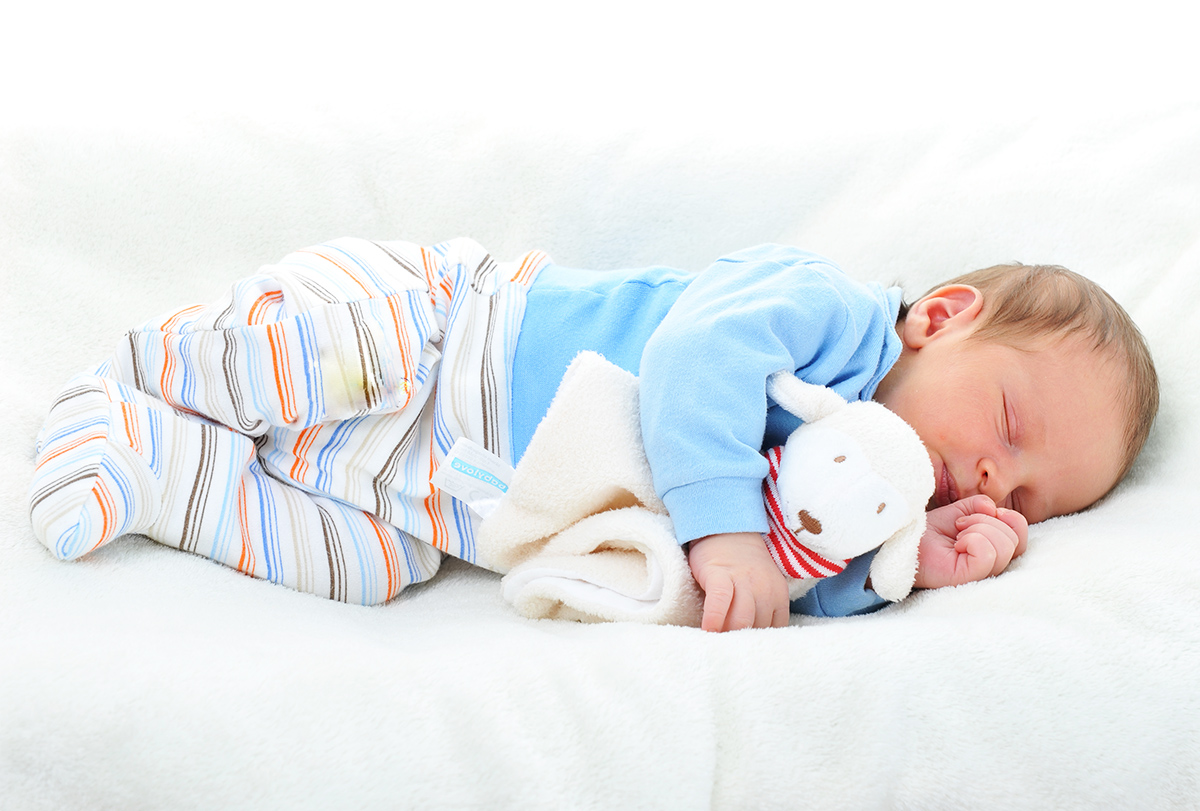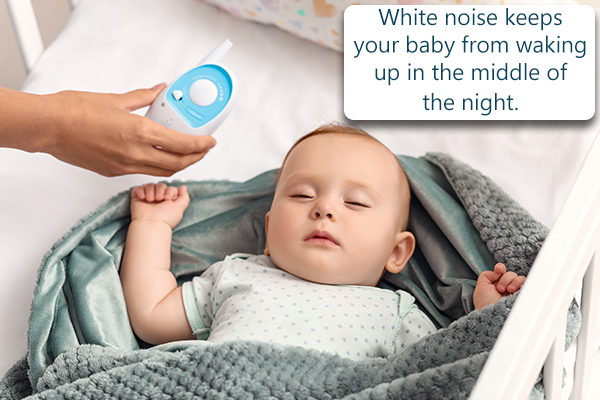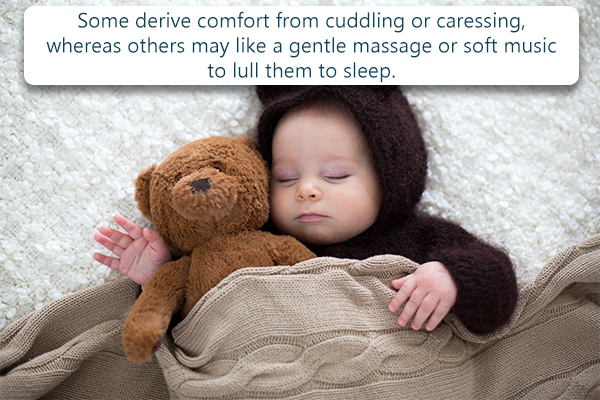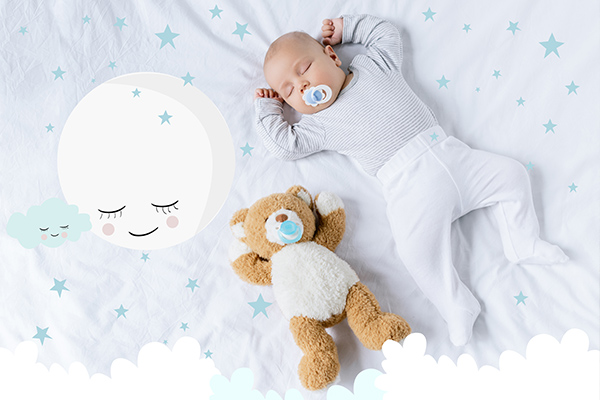In this article:
Newborns sleep for a total of 8–9 hours during the day, approximately 8 hours at night. However, their sleep duration is intermittent as they tend to wake up every 1 or 2 hours.

As your little one grows, he/she is likely to sleep for a lesser number of hours on the whole, but the length of nighttime sleep will eventually increase.
Stages of Sleep
1. Non-rapid eye movement (NREM)
This stage refers to a deep state of quiet, restorative sleep, wherein an increased blood supply to the muscles helps with tissue growth and repair. This stage is also characterized by the release of growth hormones essential for the child’s development.
2. Rapid eye movement (REM)
This stage refers to a more superficial state of “active” sleep, wherein the brain remains active even as the body becomes immobile.
During REM sleep, the baby is likely to dream and experience irregular breathing and heart rates. Newborns alternate equally between these two different stages of sleep within each sleep cycle, which stretches for about 50 minutes.
By the time the baby turns 6 months old, they spend more time in the NREM stage of a deep sleep, which covers nearly 70% of their entire sleep cycle.
Signs of Sleep Readiness
Take note of what your baby does when he/she starts to get tired. You can tell if your baby wants to nap by looking for the following signs:
- The baby may turn unusually fussy and irritable.
- The baby may rub his/her eyes a lot.
- The baby yawns constantly.
- The baby’s eyes appear droopy.
- The baby may seem distracted and look away.
Getting the Baby to Sleep Longer and Through the Night
Here are a few time-tested ways to get your baby to sleep longer at night.
1. Play white noise sounds

White noise can help lull your baby to sleep through the night by drowning out all other background sounds that occur naturally in your environment. (1)
White noise is similar to the sound that the baby hears in the womb and therefore helps your little one feel more secure and comfortable.
One study found that white noise was a better non-pharmacological measure than swinging for comforting crying, colicky babies, and improving their sleeping durations. (2)
Note: When using white noise machines, make sure to follow the doctor’s guidelines and the instruction manual to prevent any damage to your baby’s hearing.
2. Feed your baby on time
Newborns need to be fed every 2–3 hours. Feeding your little one right before bedtime can help him/her remain asleep on a full stomach for at least a few hours. Additionally, bedtime nursing can help lull your baby to sleep and prevent sleep disturbances due to untimely hunger pangs.
Babies that sleep for long, uninterrupted periods during the night need to be fed more frequently during the day to keep up with their nutritional demands. While feeding your child at night, maintain a quiet and calm environment that is conducive to sleep.
According to one study, timely feeds can ease the baby into better sleep, which also allows the mother to catch some hours of restful sleep. (3)
ALSO READ: 13 Tips to Take Care of a Newborn Baby
3. Put your baby down drowsy but awake
New parents often make the mistake of lulling their baby to sleep in their arms and then placing him/her in the crib. This makes the child completely dependent on the parent’s touch to fall asleep.
Moreover, if the baby wakes up in the middle of the night, he/she will be unable to go back to sleep unless held by the parent. Thus, parents are advised to put their baby in the crib while he/she is drowsy but still awake.
Once babies develop a habit of being rocked or nursed to sleep, it can become difficult for them to grow out of it. So, you must start early and encourage your little one to go to sleep on his/her own.
A recent study showed that 9-month-old babies who were made to sleep alone in their separate rooms got an hour and 40 minutes of extra slumber on average than those who still shared a room with their parents. (4)
4. Stick to a consistent bedtime routine and schedule

You can help condition your baby to sleep longer at night by following the same bedtime routine every day. You can start off the bedtime routine by lightly massaging the baby’s body, followed by a warm bath and a change of clothes.
You can also try different soothing interventions, such as playing or singing lullabies, cuddling, hugs, and light patting, to see what works best for your baby. It can take 3–14 days for your baby to become familiar with the bedtime routine.
Many studies have indicated that the implementation of a consistent and optimal bedtime routine is a feasible and cost-effective method to improve several health metrics in young children. (5)(6)
Moreover, it can have a direct positive impact on the quality of sleep in early childhood by improving sleep onset latency, sleep duration, and sleep consolidation. (6)
5. Keep the lights off
Bright lights can make it difficult for anyone to fall asleep as it reduces the production of melatonin, the hormone responsible for inducing sleep. Dimming or turning off the light to prepare your baby for bed will help him/her associate darkness with sleep.
Use opaque shades to keep out the sunlight from filtering in your baby’s room during daytime naps, and keep the bedroom lights off or dimmed at night. (7)(8)
Here are some baby night light dos and don’ts:
- Ensure that the light is placed at a distance from where the baby actually sleeps and closer to the areas of the room that you will need access to at night.
- Use a low-wattage light, which enables you to walk across the room without banging into things but is dim enough to allow uninterrupted sleep for your little one.
- Install a night lamp that casts a warm, red- or yellow-toned light.
- You can easily do away with night lights if you or your baby can function without it. It is supposed to be a sleeping aid rather than a necessity.
6. Regulate the room temperature
Keep your baby’s room comfortably warm during winters and comfortably cool during summers, preferably between 16°C and 20°C, to promote sound sleep.
Exposure to high temperatures overnight can overpower your baby’s internal thermoregulatory system, which is still in its nascent stages. This effect increases your baby’s wakefulness and decreases slow-wave sleep and REM sleep.
Moreover, the risk of sudden infant death syndrome (SIDS) increases if your baby is exposed to temperatures above 20°C for a prolonged period.
Cold exposure, however, rarely affects the baby’s sleep stages since the use of beddings and clothing during sleep helps with thermoregulation, allowing for comfortable body temperature. (9)
7. Keep a proper balance of activity and daytime naps
Babies that remain active during the day will gradually run out of energy and sleep better at night. Thus, it is important to keep the little ones engaged during their waking hours.
Intersperse this daytime routine with two to three short naps of 20–30 minutes ideally so that the baby does not become overtired. Also, it is important to maintain a considerable gap between the last nap of the day and your baby’s final bedtime to encourage quick and sound sleep during the night. (10)(11)
8. Consider a pacifier
Pacifiers help trigger an innate calming response in babies. Babies often start sucking on their fingers while they are still in the womb. Thus, the act of sucking reminds them of their safe space within the uterus after they are born.
One study found that the periodic sucking movement of the mouth usually helps the baby doze off and can even reduce the risk of SIDS during sleep. (12)
However, for this intervention to be safe and successful, you must take the following into account:
- For breastfed infants, wait until the baby is well accustomed to a proper nursing routine.
- Do not force the pacifier on your baby if he/she is not naturally inclined to it.
- Once the pacifier falls out of your baby’s mouth after he/she falls asleep, there is no need to reinsert it as you may disturb or wake the baby.
- Pacifiers that are fastened to infant clothing or other items such as stuffed toys pose a suffocation or choking risk and, therefore, should not be used.
Importance of Sufficient Sleep in Kids

The body re-energizes itself during sleep. Thus, quality sleep is essential to keep your body functioning well. This is particularly true for babies above the age of 3 months, toddlers, young kids, and teens, who are in the midst of their developmental phase.
Inadequate or poor-quality slumber can compromise their mental and physical growth. Sleep problems in children have been associated with behavior issues, obesity, high-risk activities, and other serious concerns.
This, however, does not imply that any child who has trouble sleeping is bound to suffer lifelong problems.
Causes of Shifting Sleep Patterns in Babies
A baby’s sleeping pattern can be quite erratic and can go through periodic phases of regression due to normal development, illness, or other causes.
“Sleep regression” refers to a temporary lapse in the baby’s sleep pattern, wherein a baby who has been getting proper sleep goes through a phase of frequent awakenings and sleep disturbances.
In most cases, the babies outgrow this untoward shift and return to a more stable sleeping pattern within a few days to a few weeks.
When to See a Doctor
Always consult your baby’s pediatrician before making any major changes to your baby’s sleeping habits, routine, or environment. Similarly, call the doctor if you notice a sudden shift in your baby’s sleeping pattern as it can be due to an illness, such as an ear infection.
If your baby experiences sleep troubles regularly despite adherence to an optimal bedtime routine, it is always a good idea to consult a pediatrician.
Expert Answers (Q&A)
Answered by Dr. Candice W. Jones, MD, FAAP (Pediatrician)

It is normal for babies to have irregular or short sleep cycles during the first 6 months of life. However, sleep gets better with time and maturity.
It depends on the age of the child. For the first couple of months, infants need to be awakened to feed at least every 4 hours. As the baby gets older, you can allow them to wake up on their own for feedings.
The Ferber method is also called “cry it out” sleep training. The goal is to help babies self-soothe by allowing them to cry for a certain amount of time before responding or comforting.
There are many types of sleep training that you can try to check which one works best for your child and also suits your family.
This is a controversial topic that has been difficult to prove either way. However, I do not recommend letting your baby cry for long periods.
Check on them and try to soothe them, but you do not have to pick them up, or do so only briefly to calm them down.
Parents use gripe water to reduce gas in colicky babies. However, there is not enough evidence to support its effectiveness.
In addition, gripe water contains various ingredients and may cause vomiting and constipation. (13)
Babies can cry at night anytime and for any reason, so checking them is important, but picking them up may not be necessary. As babies get older, they are more likely to sleep through the night.
When your baby is awake during the day, play with him/her and give plenty of attention, signaling the difference between day and night or awake and sleep behaviors.
At night, try safe, soothing strategies. Swaddle, rock gently, bounce, or pat the back while walking around, take a ride in the car, offer a pacifier, and check to make sure nothing is physically wrong, such as hunger or a dirty diaper. Do not use inclined sleepers/rockers or other sleep-promoting products that may be unsafe.
Here are some ways to promote good sleep in your baby:
• Swaddle your baby.
• Use a white noise machine.
• Keep the room dark and quiet.
• Establish a consistent bedtime routine where you give a bath, feed, and set the environment for sleep.
• Put your baby in the crib sleepy but not yet asleep. This helps them learn to get to sleep on their own.
Do not do anything unsafe. Your baby should sleep alone, on their back, and in a crib free of bumpers, stuffed animals, pillows, blankets, etc.
Final Word
All parents want their infants to sleep well and longer. Babies do not have a sense of day and night. Yet their sleep schedule can be planned, which can help them have a deep and sound sleep.
Patience and consistency are the key elements of perfecting your baby’s bedtime routine and regularizing his/her sleep-wake cycle.
- Was this article helpful?
- YES, THANKS!NOT REALLY


